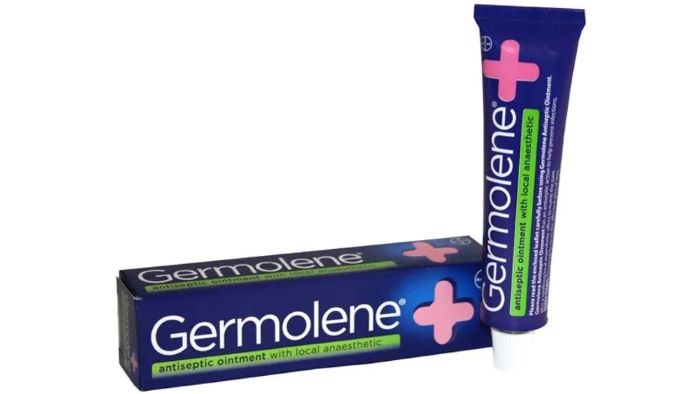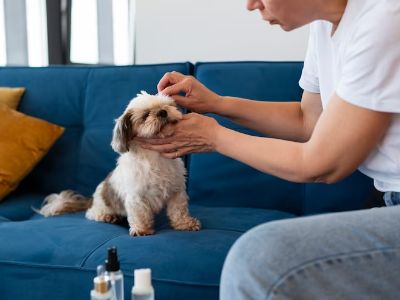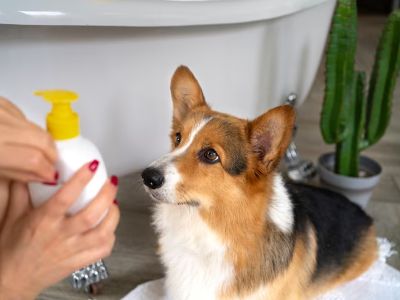Germolene is a topical antiseptic cream that is used for healing minor wounds, burns, cuts, skin irritations, and insect bites. If you have used it on yourself, you may have wondered about using it on your furry friend as well. But, Can you use Germolene on dogs?
It’s obvious for you to have this query in your mind. Because many dog owners share their opinions online or in public places while meeting other owners and mentioning the side effects of using it. So, keep reading this article and you will find some useful information on whether or not you can use Germolene on dogs.

Can You Use Germolene On Dogs?
There is no exact answer to this. Even with my extensive knowledge and experience as a vet, I cannot provide you with an exact yes or no. But, why? Well, whether or not to use Germolene on dogs totally relies on the severity of irritation, wound, or the area where it is inflicted.
To understand this better, let’s get a detailed view of this antiseptic cream and see how it is beneficiary and how it’s risky for our furry friends.
Germolene Antiseptic Cream
It is a topical antiseptic cream which is useful in dealing with cuts, wounds, burns, insect bites and skin irritations. Some even use it on their dogs. Here is a profile with a detailed view explaining, the components, and the use of this antiseptic cream:
- Active ingredients used- Phenol and chlorhexidine digluconate. Both of these ingredients seek to kill the bacteria and prevent infection.
- Action – relieve itching, numb pain, and control irritation.
- Usage – make the affected area dry and clean and afterwards, apply the cream. Cover using plaster or bandage if necessary.
- Effect – kills bacteria, but, also leaves a slight anaesthetic effect which numbs pain and relieves itching on the affected area.
- Additional components – Cetostearyl alcohol, Dimethicone, Light liquid paraffin
Now, before we have a peek at how to use this antiseptic cream on dogs, let’s break down the perks and risks that are entangled with using this cream on our furry friends.
Perks Of Using Germolene Antiseptic Creams On Dogs
Many dog owners and vets have opined that Germolene antiseptic cream is beneficial for dogs if used properly. It comes in handy while dealing with minor injury issues or skin problems. They also share that the cream speeds up the recovery process and also reduces the risk of any complications.

Here are some major perks of using Germolene on dogs:
- Helps dogs to relax and stop them from biting or scratching their wound.
- Applying Germolene cream on minor cuts, skin irritation, burns, or insect bites makes healing quick. The active ingredients present in the cream kill the bacteria and stop the infection from spreading.
- The cream has a local anaesthetic effect and hence, it easily relieves itching or irritation and numbs the pain in the affected areas of the dog.
- The presence of components such as light liquid paraffin and dimethicone helps in moisturising and protecting the skin of dogs.
- Chlorhexidine digluconate which is an antiseptic and one of the active ingredients helps in stopping fungal infections on the skin of our furry friends.
- The Coteostearyl alcohol in Germolene helps in reducing inflammation and also improves blood circulation in the dog’s skin. It’s a fatty alcohol that contains anti-inflammatory properties.
Thus, there are ample benefits to using Germolene on dogs. But, it’s not a recommended practice to use it frequently because it’s not good for treating all skin-related problems in dogs. So, if not used in moderation, it can pose some significant risks as well.
Risks Of Using Germolene On Dogs
There are many perks of using Germolene antiseptic cream on dogs but, if you are not careful, you expose your furry friend to different kinds of risks and put them in harm’s way. Here are some of the risks of using Germolene on dogs.
- Phenol toxicity
This active ingredient does help in killing of the bacteria and prevent infection but, if your furry friend accidentally ingests it, or licks the area where the cream is applied, then, it is toxic for dogs.
A dog might suffer from anaemia, diarrhoea, vomiting, weight loss or lethargy. Hence, you must only use small amounts and avoid applying it on their eyes, nose, mouth, ears, paws or genitals.
- Resistance against cream
Using Germolene for longer periods or for treating every infection may make dogs resistant to antiseptic agents. This basically means that the fungi or bacteria which is causing the infection may become immune or less sensitive to the effects of Germolene. This can make it tough for you to treat the wound or infection in future.
- Allergic reactions or skin irritation
Even if you are using Germolene in small quantities, your furry friend can still show signs of allergic reactions, or skin irritations. Some dogs exhibit signs of itching, hives, or rashes. In addition, it may also hinder the natural healing process of their skin as it creates a barrier which prevents oxygen and moisture from reaching the wound.
Hence, you must closely monitor their skin condition and look for any changes. If you observe any change indicating an allergic reaction or irritation, you must stop using the antiseptic cream on your dogs and immediately consult your vet.
- Contamination
Sometimes dog owners directly apply the cream on the wound because they are not severe or simply small. They don’t clean the wound and ultimately make their condition worse. The cream reacts with the wound and there is cross-contamination which elevates the infection or causes reinfection.
- Misdiagnosis
When you use this antiseptic cream without consulting your vet, you may end up using Germolene cream even if not necessary. For instance, if your furry friend is having a wound which is caused by a foreign agent, a parasite or a tumour, then using cream won’t help them. In fact, you are making their condition worse and delaying the diagnosis.
These were some of the risks involved with using Germolene cream for dogs. You must carefully use it on your dog. If you have any confusion you must avoid using it. Connect with your vet, and ask them if it’s okay to use it on your furry friend.
How To Use Germolene Cream On Dogs?
The risk factors may discourage any dog owner and stop them from using this antiseptic cream. However, you must focus on the perks and try to use the cream as per the vet’s advice. This helps in preventing any health issues and also helps with healing.
So, here are some of the tips you can consider while using Germolene cream on dogs:
#1. Get vet’s advice
This is quite important and probably the most important tip. You can avoid compromising your dog’s health if you connect with your vet and get their view before you use this cream. They are aware of your dog’s health and can tell you whether or not Germolene is okay for using or not.
In fact, with a vet visit, you may also know if there is a need to use the cream at all or not. If there is, the vet will provide the instructions on how much you need to apply. This will help to stop the existing wound or infection condition from getting worse.
#2. Clean the wound

When you are using the cream on your dog, you must ensure that you clean the wound. Cleaning the wound helps in preventing infection and contamination. Wash the wound using warm water, apply some soap and gently clean the wound using a clean cloth.
In addition, when you complete applying the cream, you must clean the tube with clean tissue or cloth. This ensures there are no germs present on the tip of the tube which may cause infection while using it next time.
#3. Use small quantity
In the risks section, we saw that the active ingredient phenol, which helps in treating the infection, can cause phenol toxicity if there is an overdose of Germolene. Hence, you must only use in minimum quantity and apply to the affected areas only.
Further, you must also make sure that you don’t apply the cream on sensitive areas. If you have specific instructions from your vet, you must apply the cream accordingly.
#4. Cover the affected area
Using a bandage or plaster, you need to cover the wound or infected area. This helps in preventing any sort of contact with the germs. In addition, it also keeps your dogs from licking, scratching or biting the wound. Make sure the bandage is not too tight otherwise, it may affect their blood circulation.
Further, keep changing the bandage regularly. This will help you monitor the wound or infection on a daily basis. So, if necessary, you can apply the cream again.
#5. Avoid using it on deep wounds
Germolene is only helpful in dealing with small cuts, wounds, or infections in dogs. Using it on deeper wounds or infections may hinder the healing process. This happens because it creates a blockage which stops moisture and oxygen from moving towards the wound or infection site. It’s best to consult the vet and get such wounds treated instead of using Germolene.
#6. Don’t use expired product
It’s a no-brainer, yet, some people end up using expired products because of negligence. Using expired cream may cause severe damage to the existing wound or infection. So, always make sure that it’s not expired. Because even if there is no damage to the wound, it still halts the healing process and is almost non-effective.
These were some of the ways to use the Germolene antiseptic cream on dogs and a few considerations for dog owners to think about. One must always contact their vet before they proceed with using this cream. Because if your furry friend is already on some specific medication, your vet will advise you to use it accordingly.
FAQs
Can You Use Germolene On Dogs?
Yes, there are some specific dog antiseptic creams that you can use for your dogs instead of Germolene. Neosporin and Panalog are creams which are specifically made for dogs. Both creams are safe to use on dogs and help in reducing inflammation, preventing infection, and facilitating healing in dogs.
What are the potential health hazards of using Germolene on dogs?
Germolene is used without vet consultation and can cause some serious health issues for dogs. It can lead to phenol poisoning, which can cause vomiting, diarrhoea, coma, seizures, or death. In addition, it can also cause skin irritation, allergic reactions, and burns, which can cause pyoderma or cellulitis.
Which dog breeds are more sensitive towards Germolene?
There is no curated list of dog breeds sensitive towards Germolene. But, every dog reacts differently to this antiseptic cream product when applied. The reason is simple, their age, skin coat type, weight, health condition, and prior exposure to phenol help in determining whether they are sensitive or not.
Can You Use Germolene On Dogs – Concluding Remarks!
The majority of the vets will not recommend or advise you to use Germolene on dogs. One of the prominent reasons is that it’s not made for dogs. However, sometimes they may allow it because it might help in healing the dog’s condition. A minor wound or infection is when you may get the go-ahead from your vet on using this antiseptic cream on your furry friend. We hope through our blog, “Can You Use Germolene On Dogs?” we have helped you.
However, you need to follow their instructions carefully. Otherwise, the existing wound or infection condition of your dog may deteriorate. So, being a vet I can tell that you need to use the cream in small amounts. Also, avoid applying the cream near their eyes, ears, nose, mouth or other sensitive areas.
Remember, to ensure the complete safety of your furry friend, it’s best to avoid using it. Because it’s made for human skin and the pH level will simply not suit the dogs’ skin type. Hence, look for other alternatives such as Neosporin or Panalog which are specifically made for the dogs.



